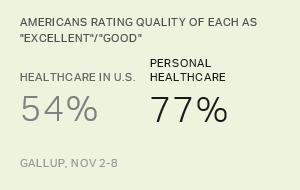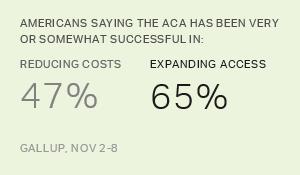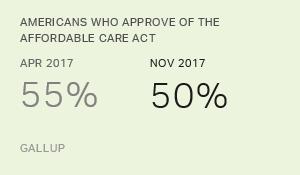Story Highlights
- 47% support a government-run system, the highest in ║┌┴¤═°'s seven-year trend
- Support for private insurance-based system is down to 48%
- Attitudes about a "Medicare for all" plan split; majority has no opinion
WASHINGTON, D.C. -- Americans' preferences for a government-run healthcare system versus a system based on private insurance are now divided. This marks a significant shift in attitudes from earlier this decade, when Americans consistently preferred the private insurance option.

Since 2010, ║┌┴¤═° updates have shown as much as a 27-percentage-point gap in favor of the private insurance system versus one run by the government. That gap shrank to 10 points last year and essentially disappeared in this year's survey, conducted Nov. 2-8, with 48% preferring the private health insurance system and 47% preferring the government-run system.
This mixed reaction toward a government-run healthcare system is similar to those seen in the past, when Democratic presidents proposed ways to increase government involvement in healthcare:
- Harry Truman proposed a national healthcare insurance system just after World War II, but fierce opposition from the American Medical Association and others kept it from becoming law. Americans initially supported the idea but ultimately opposed it.
- Lyndon Johnson proposed a government-based system for paying for healthcare for senior citizens (Medicare) and those with low incomes (Medicaid), which was passed into law. Surveys conducted in 1964 and 1965 found strong support for the new program, making this the exception to the more divided opinions on other healthcare proposals.
- Bill Clinton proposed an elaborate national healthcare system in 1993, which failed in Congress. The public -- as was the case for Truman's proposal -- was initially in favor but ended up opposing the effort.
- Most recently, Barack Obama oversaw the passage of the Affordable Care Act in 2010. Americans' attitudes toward the ACA have been mixed, tilting toward opposition for a number of years before more recently shifting to net approval.
Given this Democratic legacy in promoting increased government involvement in healthcare, it is not surprising that current attitudes are intensely partisan. Two-thirds of Democrats and independents who lean Democratic favor a government-run system. Three-quarters of Republicans and independents who lean Republican favor a system based on private insurance.
| Gov't.-run system | System based on private insurance | ||||||||||||||||||||||||||||||||||||||||||||||||||||||||||||||||||||||||||||||||||||||||||||||||||
|---|---|---|---|---|---|---|---|---|---|---|---|---|---|---|---|---|---|---|---|---|---|---|---|---|---|---|---|---|---|---|---|---|---|---|---|---|---|---|---|---|---|---|---|---|---|---|---|---|---|---|---|---|---|---|---|---|---|---|---|---|---|---|---|---|---|---|---|---|---|---|---|---|---|---|---|---|---|---|---|---|---|---|---|---|---|---|---|---|---|---|---|---|---|---|---|---|---|---|---|
| % | % | ||||||||||||||||||||||||||||||||||||||||||||||||||||||||||||||||||||||||||||||||||||||||||||||||||
| Republicans/Leaners | 22 | 76 | |||||||||||||||||||||||||||||||||||||||||||||||||||||||||||||||||||||||||||||||||||||||||||||||||
| Democrats/Leaners | 67 | 29 | |||||||||||||||||||||||||||||||||||||||||||||||||||||||||||||||||||||||||||||||||||||||||||||||||
| GALLUP, Nov. 2-8, 2017 | |||||||||||||||||||||||||||||||||||||||||||||||||||||||||||||||||||||||||||||||||||||||||||||||||||
Although the 22% of Republicans who support a government-run system is low on an absolute basis, it is the highest in ║┌┴¤═°'s seven-year trend. Republicans' shift in attitudes accounts for most of the overall increase in support for the government system in this year's update.
Americans Split on a Medicare for All System
Vermont Sen. Bernie Sanders in recent years has become a highly visible Democratic politician calling for expanded government involvement in the nation's healthcare system. He -- along with one-third of Democratic senators -- recently introduced a Senate bill calling for a single-payer, "Medicare for all," government-funded health insurance system.
║┌┴¤═°'s Health and Healthcare survey this year included a question asking directly about support for this specific type of plan, including an explicit "don't know enough to say" option. Although most Americans choose the "don't know" option, those with an opinion about the specific Sanders-type bill as described in ║┌┴¤═°'s wording are about evenly divided.
| % | |||||||||||||||||||||||||||||||||||||||||||||||||||||||||||||||||||||||||||||||||||||||||||||||||||
|---|---|---|---|---|---|---|---|---|---|---|---|---|---|---|---|---|---|---|---|---|---|---|---|---|---|---|---|---|---|---|---|---|---|---|---|---|---|---|---|---|---|---|---|---|---|---|---|---|---|---|---|---|---|---|---|---|---|---|---|---|---|---|---|---|---|---|---|---|---|---|---|---|---|---|---|---|---|---|---|---|---|---|---|---|---|---|---|---|---|---|---|---|---|---|---|---|---|---|---|
| Favor | 17 | ||||||||||||||||||||||||||||||||||||||||||||||||||||||||||||||||||||||||||||||||||||||||||||||||||
| Oppose | 21 | ||||||||||||||||||||||||||||||||||||||||||||||||||||||||||||||||||||||||||||||||||||||||||||||||||
| Don't know enough to say | 61 | ||||||||||||||||||||||||||||||||||||||||||||||||||||||||||||||||||||||||||||||||||||||||||||||||||
| GALLUP, Nov. 2-8, 2017 | |||||||||||||||||||||||||||||||||||||||||||||||||||||||||||||||||||||||||||||||||||||||||||||||||||
Other survey organizations also have found generally mixed opinions about a single-payer, government system -- although the results vary, depending on how it is described. The high percentage who say they "don't know enough to say" when that is a response option (as in ║┌┴¤═°'s wording) suggests that Sanders' efforts to promote a single-payer plan throughout his run for president and over the past two years have not made it a widely understood or familiar proposal.
Implications
The debate over the appropriate role for the U.S. government in delivering healthcare has been on the nation's policy agenda for three-quarters of a century. During this time, Americans' attitudes toward increasing government involvement in healthcare -- in general and in reaction to specific healthcare plans -- have been decidedly mixed.
Currently, the public is as likely to say they favor the concept of a healthcare system run by the government as to favor a private insurance system, a shift from all prior years this decade. These divided views suggest that Americans have yet to be persuaded that either a government-run system or a system based mostly on private insurance is the most desirable alternative for addressing issues relating to healthcare access and cost.
The healthcare issue has been, and continues to be, highly partisan, with debates over healthcare options among the most rancorous of the day. Republicans continue to push for dismantling the ACA, while many Democratic senators want to go beyond what the ACA does and institute a government-run, single-payer system. The mixed guidance from the public shows that the challenge for both sides remains persuading a significant majority of Americans that their way is the right way.
Survey Methods
Results for this ║┌┴¤═° poll are based on telephone interviews conducted Nov. 2-8, 2017, with a random sample of 1,028 adults, aged 18 and older, living in all 50 U.S. states and the District of Columbia. For results based on the total sample of national adults, the margin of sampling error is ┬▒4 percentage points at the 95% confidence level. All reported margins of sampling error include computed design effects for weighting.
Each sample of national adults includes a minimum quota of 70% cellphone respondents and 30% landline respondents, with additional minimum quotas by time zone within region. Landline and cellular telephone numbers are selected using random-digit-dial methods.
View survey methodology, complete question responses and trends.
Learn more about how the works.





